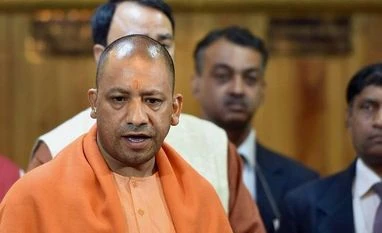The massive farm loan waiver amounting to Rs 36,000 crore in the current fiscal has virtually upset the fiscal mathematics of the ruling Yogi Adityanath government in Uttar Pradesh.
While, the ruling Bharatiya Janata Party (BJP) dispensation had made provisions in the Annual Budget 2017-18 to fulfill its flagship promise of waiving small and marginal farmers’ loans, the big outlay has literally squeezed the state’s finances to nothing.
The UP tax kitty has also been facing teething troubles owing to the Goods and Services Tax (GST), which has further compounded the challenge of matching outlays with revenues. As a result, the state is forced to cut corners under other expenditure heads.
With current financial year 2017-18 at the threshold of last quarter (Jan-Mar 2018), the Yogi government has now decided to defer the first installment of 7th Pay Commission arrears of about Rs 7,000 crore payable to 26 lakh employees and pensioners to the next fiscal 2018-19.
Earlier, the first installment comprising 50 percent of Pay arrears pertaining to the period from January 1, 2016 to December 31, 2016 was payable during 2017-18 fiscal and the remaining 50 percent in 2018-19.
On Friday, UP finance department secretary Mukesh Mittal issued a Government Order (GO) informing that now the first and second installments of the 7th Pay Commission arrears would be paid during 2018-19 and 2019-20 fiscals respectively.
UP finance department sources said mammoth budgetary allocation towards the farm loan waiver and rather subdued GST collections had drained the exchequer and it was difficult to pay the arrears in the current fiscal.
On December 13, 2016, the then Akhilesh Yadav cabinet had approved the 7th Pay Commission recommendations, which was projected to benefit an estimated 16.52 lakh government employees and 10.50 lakh pensioners’ in the state. It included state employees, teachers and non-teaching staff of aided educational and technical training institutions, employees of local bodies, district panchayats, development authorities, public sector undertakings/corporations and autonomous institutions.
The Akhilesh government had constituted UP pay committee headed by retired state bureaucrat G B Patnaik in light of the Narendra Modi government deciding to implement the 7th Pay Commission recommendations retrospectively from January 1, 2016. The state committee had recommended providing hikes with retrospective effect from January 1, 2016 in the state.
The committee had recommended a minimum scale of Rs 18,000 to a maximum of Rs 2.24 lakh per month. The average salary hike was touted at 14-18 percent.
During the erstwhile tenure of UP chief minister Mayawati, the state in November 2008 had approved the recommendations of the state pay committee on the 6th Pay Commission for 1.5 million state employees. At that time, new pay scales for the government employees and pensioners had also come into effect with retrospective effect from January 1, 2006.
Meanwhile, the Yogi government is already preparing for the next Annual Budget 2018-19.
Yogi’s maiden Annual Budget 2017-18 presented on July 11, 2017 had managed to keep the fiscal deficit below the stipulated 3 percent even as the Annual Budget size had grown by almost 11 percent to Rs 3,84,659 core.
The Yogi Budget has estimated receipts of Rs 3,77,190 crore, including Rs 3,19,397 crore and Rs 57,793 crore under revenue and capital heads respectively. The revenue receipts comprised Rs 2,32,908 crore as tax revenue, of which Rs 1,11,501 crore and Rs 1,21,406 crore was anticipated to accrue as own tax receipts and UP’s share in central taxes respectively.
The Budget had projected expenditure of Rs 3,84,659 crore, including Rs 3,07,118 crore and Rs 77,541 crore by way of revenue and capital expenditure respectively. This way, the annual financial statement projects revenue savings of Rs 12,278 crore during 2017-18 fiscal.
Unlock 30+ premium stories daily hand-picked by our editors, across devices on browser and app.
Pick your 5 favourite companies, get a daily email with all news updates on them.
Full access to our intuitive epaper - clip, save, share articles from any device; newspaper archives from 2006.
Preferential invites to Business Standard events.
Curated newsletters on markets, personal finance, policy & politics, start-ups, technology, and more.
)